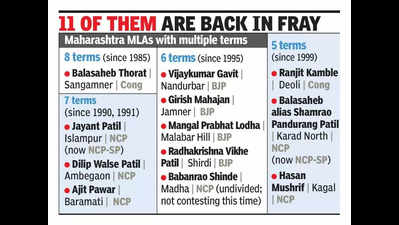
Pune: Even as many sitting MLAs across Maharashtra face anti-incumbency , there are 12 who have managed to win their seats for more than five consecutive terms, including three who remained undefeated seven times in a row from the same constituency. At least 11 are back in the poll arena. Late PWPI leader Ganpatrao Deshmukh was the longest-serving MLA in Maharashtra's history, as he was elected to the state assembly for 11 consecutive terms from Sangola.
Among the current serving MLAs in the state, Congress MLA Balasaheb Thorat is the senior-most, who won the Sangamner seat for eight consecutive terms since 1985 and is now eyeing to win it for the ninth time. The other MLAs who remained undefeated in their respective constituencies for a longer period include Dilip Walse Patil from Ambegaon and Jayant Patil from Islampur, who won for seven consecutive terms since 1990. Similarly, deputy CM Ajit Pawar also won all the assembly elections from Baramati after he first won a by-election here in 1991.
Babanrao Shinde, the former MLA of NCP (undivided), who won from Madha constituency for six consecutive terms, is not contesting the election this time. His son Ranjit Shinde is in the fray as an independent. Besides, there are also five legislators who remained undefeated in their respective constituencies since 1995, while three more have not lost any assembly election since 1990.
When asked about how he manages to defeat anti-incumbency in the constituency, Balasaheb Thorat said, "The most important thing is to have a clear vision, and one should sincerely work hard for it. This has been the way for my consistent victory. Once I win the election and our celebrations are over, the first paper with which I go to people is the beginning of preparation for my next election.
" Political analysts say family legacy plays an important role in some constituencies like Baramati, Shirdi, or Sangamner, while "the institutional network of these leaders in their respective constituencies, such as education institutes, sugar mills, or cooperative banks, also helps them establish a regular connection with a large number of their voters. In some cases, these voters are also dependent on their leaders because they benefit in some way," said Parimal Maya Sudhakar, associate professor at the MIT's School of Government, Pune..














